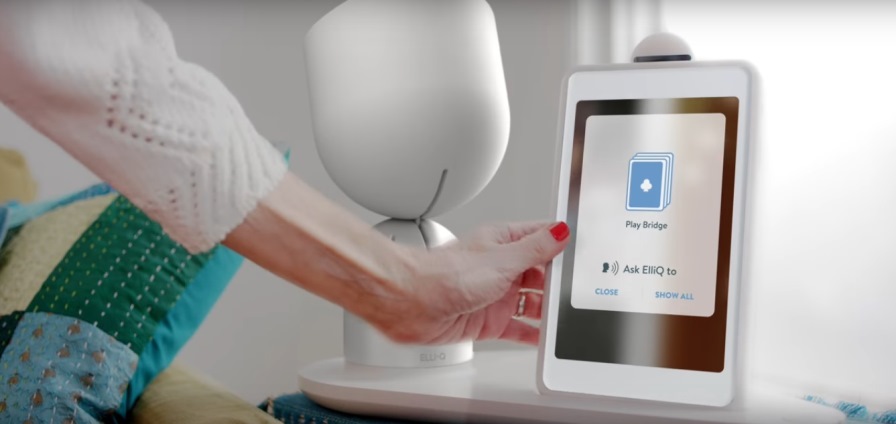Steve Moran sat down with Dor Skuler, Co-founder and CEO of Intuition Robotics, to discuss its active aging robot companion for seniors, Elli-Q.
By Pam McDonald
At the recent Silicon Valley Boomer Venture Summit, Senior Housing Forum Publisher Steve Moran sat down with Dor Skuler, Co-founder and CEO of Intuition Robotics, to discuss its active aging robot companion for seniors, Elli-Q. As part of Steve’s Conversations series, the entire interview can be viewed below. The following are some highlights.
Introducing Elli-Q
Dor describes Elli-Q as a social companion that helps “older adults practice active aging to overcome the digital divide . . . stay independent . . . and enjoy this phase of their life.
“Elli-Q is really targeting people that are independent,” he says. “They’re cognitive, they live usually in their own home or in independent living facilities . . . They might need something that will proactively suggest to them activities to help them meet their own goals towards an active aging lifestyle.”
He notes that the four main things Elli-Q helps with are:
-
Communications with family, who can video chat, share pictures, etc.
-
Engagement with content available online, like music, lectures, audio books, and cognitive games,
-
Daily activities, like ordering rides and providing reminders of important events and meetings, and
-
If desired, wellness, by suggesting activities, providing medication reminders, and monitoring unique events so they can be shared with the family.
Elli-Q vs. Alexa
Steve wonders how Elli-Q is different from Alexa or the Google product. Dor points out, “It is a proactive system and not a reactive system. With Alexa or Google Home, you need to drive it using very precise syntax. You have to say, ‘Alexa play Mozart’ and she’ll play Mozart.
“Here we’re talking about a system, which is a completely autonomous agent that observes what’s happening at home and finds the opportune time to interrupt and say, ‘Hey, how ‘bout we listen to music?’ Or, ‘It’s a beautiful day. Why don’t you go for a walk?’”
Elli-Q in Action
Dor recommends watching the demonstration video here to see Elli-Q in action. He says, “There is a lot of animatronics happening. Elli-Q comes to life . . . [she’s an entity] that moves and uses body language to communicate, which really makes it easier for older adults to use technology.
“For example, if you get something wrong, she’ll look down and slowly look up . . . the user understands she’s apologizing. And, if there’s a message waiting from a grandson, she’ll be all jittery and happy about it.” Its tablet-like screen also displays the intent of what’s being said, which make her use more intuitive.
Steve and Dor discuss the set up that’s needed so Elli-Q knows the user likes Mozart rather than the blues. Wi-Fi is required and a few basic questions help “our machine’s learning algorithms know where to place you on the graph.
“She might say, ‘do you prefer classical music or not?’ And then she kind of knows where to place you and, from that point on, she learns; so she’ll suggest things to you and based on what you answer, she’ll fine tune her knowledge.”
Personality Plus
Dor continues, “She also does the same as far as her attitude. So she might speak differently to you than me. For you, maybe she’ll understand that . . . to motivate you to change your routine, she needs to be more aggressive. She might say, ‘Hey Steve. Come on, you’re wasting your day watching TV. Go for a walk.’
“But for me since I’m a sensitive guy maybe I’ll get offended at that. Maybe she’ll just do a little beep and then look at the screen to get my attention. On the screen will be the weather report and an animation of somebody going for a walk in the park . . . those type of things are really, really important because all of us are different and it takes different approaches in order to motivate us to change our routine.”
The company is currently conducting user trials and, when they’re complete, will begin what Dor calls “’value-prop’ testing, which is putting . . . a few dozen units in people’s homes for prolonged periods . . . to see if she actually has the value delivered of helping improve their lives, change their routines, and so on. And, once we get convinced we’re able to do that, we’ll start shipping the product.”
Pricing Models
Intuition Robotics is also reviewing pricing models. Dor says, “We’re trying to understand what people prefer and it will either be . . . a lower upfront price and a monthly fee, or a higher up upfront price and no monthly fee . . ..” Also impacting final pricing will be if Elli-Q ends up being a frequent gift to users or if it’s delivered through independent living and others living arrangements in the longevity ecosystem.
“By the way,” Dor points out, “we’re signing people up for the beta program for free [on the website]. There’s a questionnaire they have to fill out to see that it helps us with our research . . .. You can sign up and maybe get a free unit for a few months.”
Resident Communication
He notes, “Independent communities have a real need to communicate with their residents. This can save them a check up call in the morning because Elli-Q sees [its users]. It can help them [users] be aware of activities that are going on. ‘Hey there’s a great lecture by an author today in the common area in two hours. If you want to catch that maybe you should get ready.’”
Mass emails can be sent to a group as can community calendars so Elli-Q so will remind users of upcoming events and even arrange for a ride if need be. Dor says, “We’re working with . . . the ride sharing companies to facilitate that automatically.”
He also notes that with its video conferencing capacity, communities will be able to check in on residents with Elli-Q and residents will gain telehealth services.








